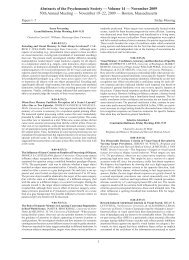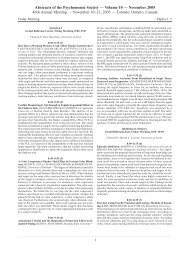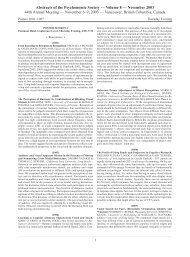S1 (FriAM 1-65) - The Psychonomic Society
S1 (FriAM 1-65) - The Psychonomic Society
S1 (FriAM 1-65) - The Psychonomic Society
Create successful ePaper yourself
Turn your PDF publications into a flip-book with our unique Google optimized e-Paper software.
Posters 3085–3091 Friday Evening<br />
(3085)<br />
Impairment of Scene Recall Due to Part-Set Cuing. DANIEL R.<br />
KIMBALL, WILLIAM A. COKER, & JAMES R. ERICKSON, University<br />
of Texas, Arlington—Recall impairment due to part-set cuing<br />
has been studied extensively using verbal stimuli, but to date there has<br />
been no evidence reporting applicability of the phenomenon to more<br />
ecologically valid stimuli, such as everyday scenes (kitchen, office,<br />
etc.). We found reliable part-set cue-induced impairment of recall for<br />
objects in such scenes when the cues were the names of schematically<br />
consistent objects, whether or not such cues had appeared in the scene.<br />
However, the effect of cue number varied depending on whether the<br />
cues had or had not appeared in the scene: When the cues had appeared,<br />
such impairment increased as a function of the number of<br />
cues, as with word list recall. When the cues had not appeared in the<br />
scene, impairment did not differ with cue number, unlike with word<br />
lists. <strong>The</strong>se results have practical ramifications for eyewitness memory<br />
and present a challenge to part-set cuing theories.<br />
• LEARNING AND MEMORY •<br />
(3086)<br />
Feedback Timing in Semantic Learning: Spacing and the Delay-<br />
Retention Effect. TROY A. SMITH, DANIEL R. KIMBALL, &<br />
MARTHA MANN, University of Texas, Arlington—<strong>The</strong> empirical<br />
findings to date regarding the effects of delaying feedback on learning<br />
and long-term retention are unclear: Some studies have found an<br />
advantage for delayed feedback, some an advantage for immediate<br />
feedback, and some no difference. In three experiments involving new<br />
semantic learning of trivia facts, we tested the extent to which spacing<br />
and lag effects can account for the seemingly contradictory findings<br />
in the literature. Experiment 1 compared the effects of varying<br />
the timing of repeated study trials, repeated test trials, and feedback<br />
trials. Experiments 2 and 3 examined the effects of restudy and retest<br />
opportunities following immediate and delayed feedback trials, and<br />
the impact of varying the lag between initial study and feedback. <strong>The</strong><br />
results support the spacing hypothesis and challenge competing theories<br />
of feedback timing. We compare the results to predictions of the<br />
new theory of disuse (Bjork & Bjork, 1992).<br />
(3087)<br />
Contribution of Prior Semantic Knowledge to New Episodic Learning<br />
in Amnesia. IRENE P. KAN & MIEKE VERFAELLIE, Boston<br />
VA Healthcare System—We evaluated whether prior semantic knowledge<br />
would enhance episodic learning in amnesia. Subjects studied<br />
prices that are either congruent (i.e., market value) or incongruent<br />
(i.e., four times higher) with prior price knowledge for household and<br />
grocery items and then performed a forced choice recognition test for<br />
the studied prices. Consistent with a previous report, healthy controls’<br />
performance was enhanced by price knowledge congruency; however,<br />
only a subset of amnesic patients experienced the same benefit.<br />
Whereas patients with damage restricted to the medial temporal lobes<br />
experienced a significant congruency benefit, patients with damage<br />
also including the lateral temporal lobes did not experience a congruency<br />
benefit. Moreover, the extent to which patients experienced<br />
a congruency benefit was positively correlated with their prior price<br />
knowledge. Our findings are consistent with the idea that episodic<br />
memory is enhanced when the to-be-remembered information can be<br />
anchored to prior knowledge.<br />
(3088)<br />
Early Encoding Impairment in Schizophrenia. MARIE-LAURE<br />
GRILLON & CAROLINE HURON, INSERM—Investigations of<br />
memory impairment in schizophrenia have frequently revealed a<br />
strategic processing deficit at encoding. <strong>The</strong> present experiment was<br />
designed to investigate an early encoding process, refreshing (i.e., the<br />
process of thinking of a stimulus that has just been seen). Twenty-five<br />
patients with schizophrenia and 25 control subjects read words out<br />
aloud as they appeared on a screen. Critical words were read, re-<br />
99<br />
freshed, or repeated, following presentation of a column of three<br />
words or a single word in the top, middle, or bottom position of the<br />
screen. As a surprise test, participants were asked to recognize the<br />
words seen previously and to give remember, know, or guess responses.<br />
<strong>The</strong> results showed that patients were disproportionately<br />
slower or less accurate in the refresh condition. Nor, in contrast to controls,<br />
did they derive the beneficial effect of refreshing on conscious<br />
recollection. <strong>The</strong>se results provide evidence that schizophrenia impairs<br />
an early encoding process.<br />
(3089)<br />
Ironic Effects of Censorship: Generating Censored Lyrics Enhances<br />
Memory. MATTHEW R. KELLEY, Lake Forest College, JAMES E.<br />
BRIGGS, University of Wisconsin, Milwaukee, JAMES C. CHAM-<br />
BERS, Wheaton College, EMILY BLEGEN & DUSTIN KOCH, Lake<br />
Forest College, & JOANNA C. BOVEE, University of Illinois, Chicago—<br />
Two experiments explored the generation effect—mnemonic advantage<br />
for self-generated information—in the applied setting of lyrical censorship.<br />
Participants listened to an original song in which a subset of<br />
nouns were either partially or completely censored and then completed<br />
a recognition memory test consisting of heard, censored, and<br />
distractor items. Overall, recognition accuracy did not differ for censored<br />
and heard items, despite the fact that the censored items were<br />
never presented. More importantly, when the data were made conditional<br />
upon successful generation of the censored item during encoding,<br />
the standard generation effect was observed—recognition accuracy<br />
was significantly higher for the generated censored items<br />
compared with the heard items. Additionally, when asked to judge the<br />
source of the recognized words, participants routinely erred and indicated<br />
that they remembered “hearing” these nonpresented words.<br />
<strong>The</strong>se results suggest that, by omitting certain words from songs, censors<br />
might actually make those words more memorable!<br />
(3090)<br />
What Form of Memory Underlies Novelty Preferences? KELLY A.<br />
SNYDER, University of Denver, & MICHAEL P. BLANK & CHAD J.<br />
MARSOLEK, University of Minnesota (sponsored by Chad J. Marsolek)—Novelty<br />
preferences (longer fixations on new stimuli than on<br />
previously presented stimuli) are widely used to assess memory in<br />
nonverbal populations such as human infants and experimental animals,<br />
yet important questions remain about the nature of the processes<br />
that underlie them. We used a classical conditioning paradigm to test<br />
whether novelty preferences reflect a stimulus-driven bias toward novelty<br />
in visual selective attention or explicit memory for old stimuli.<br />
<strong>The</strong> results indicated that conditioning affected adults’ looking behavior<br />
in the visual paired comparison task but not their recognition<br />
memory judgments. Furthermore, the typically observed novelty preference<br />
occurred only when a bias toward novelty had no competition<br />
from a bias toward salience due to conditioning. <strong>The</strong>se results suggest<br />
that novelty preferences may reflect attentional processes and implicit<br />
memory to a greater degree than explicit memory, a finding with important<br />
implications for understanding memory in nonverbal populations<br />
and the development of memory in humans.<br />
(3091)<br />
Individual Differences in Intentional Versus Incidental Learning: Effects<br />
of Handedness and Interhemispheric Interaction. STEPHEN D.<br />
CHRISTMAN & MICHAEL BUTLER, University of Toledo—Research<br />
indicates a robust episodic memory advantage for mixed-, relative to<br />
strong right-, handers, arising from increased interaction between left<br />
hemisphere-based encoding and right hemisphere-based retrieval<br />
processes in mixed-handers. Most of this research has employed intentional<br />
learning. <strong>The</strong> purpose of the present study was to investigate<br />
possible handedness differences under conditions of incidental learning,<br />
using the procedure developed by Craik and Tulving (1975) in<br />
which subjects make either structural, phonemic, or semantic judgments<br />
about words, followed by a surprise memory test. A fourth<br />
group studied words under intentional learning instructions. Repli-





